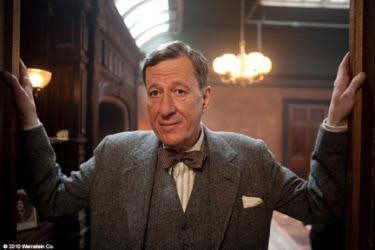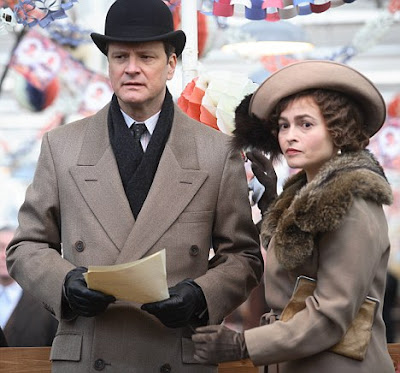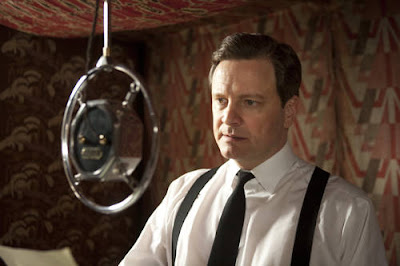The King's Speech
Director: Tom Hooper
Starring: Colin Firth, Geoffrey Rush, Helena Bonham Carter
It's easy to see why Colin Firth is getting Oscar buzz for his work as the eventual King George VI of England in this movie: it's a powerful performance, at various times full of self-loathing, uncertainty, stubbornness, and redemption. The King's Speech is a feel-good movie, but one that doesn't overtly manipulate the audience while providing some interesting commentary on the power of communication in the digital age. Based on true events, the film chronicles the rise of the Duke of York (Firth), plagued with a stammer, to the position of King and his relationship with a common speech therapist enlisted to help him, Lionel Logue (Rush).
Director Tom Hooper has been earning critical praise for his work for many years now, most recently with the well-reviewed John Adams miniseries on HBO. His confidence behind the camera shows here in a testament to subtlety; one can easily imagine a melodramatic version of these events, and I much preferred Hooper's subdued take on the material. Aside from easing solid performances out of his actors, Hooper isn't afraid to add a bit of flair to the proceedings; in one "training" scene, the camera rolls forward and backward over the same piece of living room floor, but each time it rolls back, it reveals the characters in another state of training. The movie cashes in on one of humanity's biggest fears - public speaking - and doesn't shy away from uncomfortable situations to really drive home how important this aspect of royalty truly is. At times, the film is agonizing to watch; we feel so bad for our hero that we desperately want him to succeed, and Hooper is able to skillfully strike that balance.
But as much as this is Colin Firth's movie, it also belongs to Geoffrey Rush. The two are downright jovial together on screen, and their budding friendship is almost impossible not to like. Rush brings aforementioned humor and charm in spades, dropping the King down a few pegs during their sessions by demanding equality and referring to him not as "Your Majesty," but as "Bertie." (Before he adopts the "King George VI" moniker, he's known as Prince Albert. Hence, "Bertie.") Helena Bonham Carter plays one of the most normal characters she's played in years here as Queen Elizabeth, forever supportive of her husband as he yearns to be rid of his crippling stammer.
As if the stammer weren't enough, "Bertie" is humanized even more by the scenario in which he finds himself: his older brother David (nicely played by underrated actor Guy Pearce) leaves the throne to marry a divorced woman, leaving the younger brother to fill in during the beginning of WWII. The title The King's Speech refers not only to the unfortunate speaking patterns of Colin Firth's character, but also a singular speech that occurs during the climax of the film. (It's also a play on the phrase "the King's English," but that's not as obvious.) The movie is paced a bit slow for my tastes, but remains enjoyable to watch - any scene which features Rush and Firth is a treat. But the ones that don't cause the movie to drag on a bit, and hope for another interaction between these fledgling friends.
It's tough to make a movie about public speaking seem interesting, but Hooper takes on the challenge and relies on his excellent cast to do most of the work for him. Since they're all capable actors, they easily accomplish this goal, and leave Hooper the work of making the speech scenes suspenseful because we never quite know how well Logue's unconventional approach to therapy will work. Recommended for those wanting to stay "in the know" this Oscar season, and for those who like well-acted feel-good dramas. Until next time...





No comments: